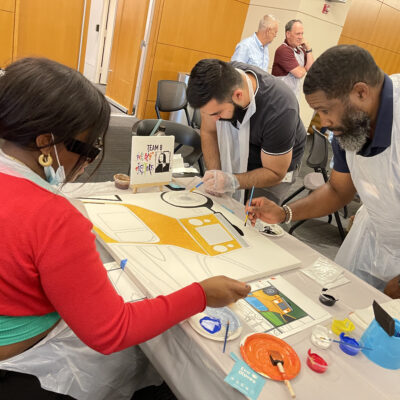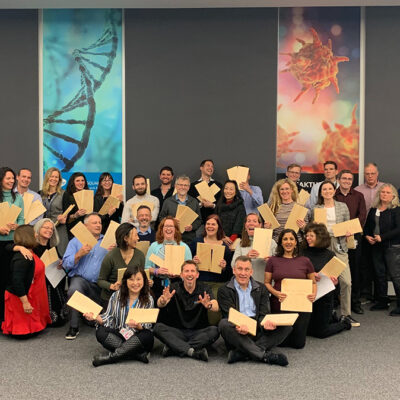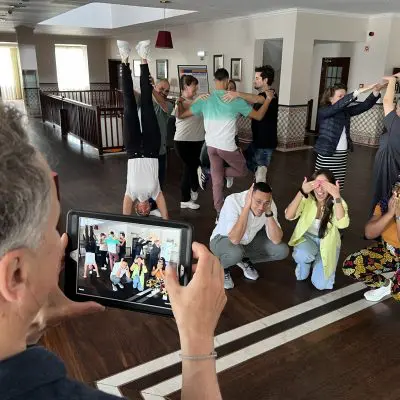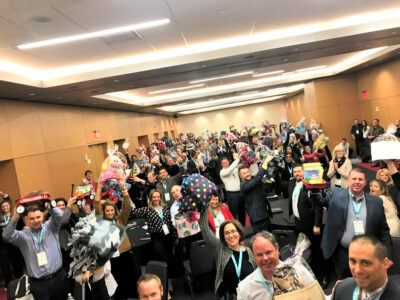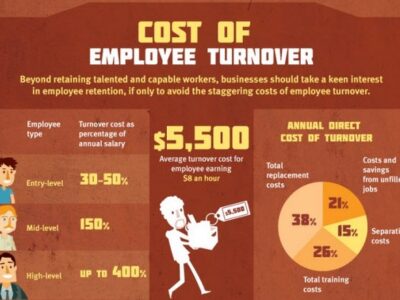Workplaces are always changing. Whether it’s employees, tasks, goals, or core values, businesses constantly evolve. This poses a challenge; how can you keep adapting to change in the workplace while keeping teams together and morale high? The answer is simple—emphasizing adaptive skills.
We talked with our founder and COO, David Goldstein in our Team Building Saves the World podcast episode, Making Work Fun. One of the key topics discussed was the impact of COVID and how TeamBonding was able to successfully navigate a changing workplace during the pandemic.
Today, we’re going to continue that conversation and take a deeper look at how to adapt to change in the workplace. We’ll cover the basics of adaptive skills and explain how to foster those skills to make your business more adaptable.
What are Adaptive Skills?
Let’s start at the very beginning; what are adaptive skills? Adaptive skills are skills that enable you to adjust and adapt to a changing environment. These skills help people adjust to changing tasks, environments, and more.
Many of the skills overlap with power skills, such as communication and teamwork. However, these skills are focused solely on helping you adapt to changes and make the adjustments necessary to keep going. While a lot of people are naturally adaptive, others are not. However, these skills can be developed. Anyone can learn to become more adaptable. That’s why professional development is important; it’s an opportunity to learn and develop these skills.
Adaptive Skills Examples
Now that we’ve explained the basics, let’s look at things from a more practical perspective. We’re going to prove some adaptive skills examples to help make it more clear why adaptability is so important in the workplace.
While this list won’t cover every skill relating to adaptability, these five are some of the most important ones and should help make it clear why they’re so important.
Collaboration
Collaboration is a key skill for adaptability at work. Communicating effectively with those around you can help you come together and weather those changes as a team, providing the support and skills necessary to keep going. Goldstein emphasized this during our conversation, noting the importance of having friends you can rely on when you need help. He said:
“There’s definitely a challenge to companies on how they can get their people to work better together. Some people are working at home, some people are working in the office, some people are working wherever they happen to be working. There is a challenge to be more productive. And I think one of the ways—whether it be corporate retreats or just a day off or a day out together—they need to bond together so they’re able to have each other’s back. If you need help, you can’t just reach out to someone you’ve never met. But if you’ve had a shared experience, if you’ve done something, if you’ve built something, or solved something, or donated something, you’ve got a way to bond with that person.”
When things are changing around you and you need a helping hand, there is no better option than those you have strong bonds with. Collaborating with them to get through is essential if you want to be more adaptable.
Technology Competence
Another necessary adaptive skill is technology competence. Workplace technology is rapidly evolving, so you need to be able to adjust to new advancements as they emerge. For example, COVID forced many companies to go virtual. Because of this, employees had to start using platforms such as Slack or GoogleTeams to do their jobs. Without the ability to learn this new technology and adapt, they would have been in a rough position.
And that’s but one example. Technology is constantly changing in the workplace. From email to AI in the workplace, there is always some new technology, and businesses and their employees need to be technologically competent enough to keep up.
Creativity
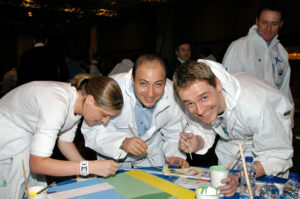
Employees participating in Big Picture, a mural painting team building event to inspire creativity!
Creativity is also key for adapting to changes. Changes bring new challenges, and you need to have the creativity to find new ways of thinking to overcome those challenges.
An example of this is a market that’s changing, requiring a company to develop a new product. They need to be creative enough to meet these changing needs in the market and come up with a new product that satisfies customers while staying true to the company and its values.
Open-Mindedness
Change means new ideas, new problems, new solutions, and new opportunities. Those who want to adapt to changes need to be open-minded and embrace these new ideas, problems, solutions, and opportunities, creating a culture of adaptability.
In our conversation, Goldstein noted a moment of his own adaptability. He was able to recognize the issues TeamBonding was facing during COVID, and he was open-minded enough to realize virtual programs were a possibility. He summed this up by saying:
“It’s probably one of the things I’m most proud of—the fact that I was able to recognize what was going on. I was able to make the decision. I was able to invest in the idea that we could do virtual programs.”
Critical Thinking
One last example of adaptive skills is critical thinking. During times of change, employers and employees need to think critically about the changes and how to adapt to them. An example of this is a new technology like AI. When something like that hits the market, you need to think critically about how you use it. Do you use it to replace employees, as a tool to help employees, or do you not use it all?
Being able to think critically and make those tough decisions is essential for adaptability. This is also why skill development is important; it’s an opportunity to develop skills like critical thinking that let you deal with changes, no matter how big.
How to Foster Adaptability Skills Development
Knowing what adaptive skills are and why they’re important is one thing, but actually fostering and implementing them is another. That may seem like a big hurdle, but it’s something any business can accomplish with the right strategies. So, here are four strategies you can use to foster adaptability in the workplace and encourage the growth of adaptability skills.
Provide Regular Feedback
One of the most basic things that can help with adaptability is feedback. If you want to be adaptable, you need to encourage growth. And if you want to encourage growth, then you need to implement regular feedback. This can come in many forms, such as one-one-ones, quarterly reviews, informal group feedback sessions, and more. Utilizing one or more of these can help people identify areas for improvement and develop their skills, helping them become more adaptable.
Recognize and Reward Hard Work
Another important strategy is recognizing and rewarding hard work. It seems simple, but it really can have a big impact on helping employees become more adaptable. As humans, we all want to be recognized and rewarded for our hard work. Doing so helps keep us motivated and engaged, which in turn helps us push through difficult times of change.
It also encourages employees to strive for more, develop their skills, and become more adaptable so they can continue to be recognized for their work. On top of that, it can also open the door for internal mobility. Rewarding employees for their work through promotions can help them learn new skills and abilities that make them more prepared for change.
Provide Training and Development
Arguably the most direct way to foster adaptability skills is through training and employee development. Training is a way to directly work on adaptive skills, improving and developing them so employees are more adaptive. As with feedback, there are lots of different ways to go about this. There are online professional development workshops, in person trainings, seminars, job swapping, and much more.
Regardless of what method you choose, the important thing is that you are providing training and development. You’ll make your employees more adaptable while also improving key skills that make them more creative, efficient, and effective contributors overall.
Facilitate Cross-Functional Collaboration
Lastly, facilitating cross-functional collaboration is an excellent way to develop adaptive skills. These collaborations bring teams together from various departments, helping them learn more skills and become more adaptable to different challenges.
This is also a great opportunity to utilize team building. During our conversation, Goldstein mentioned how many options there are for team building when he said:
“In the beginning, I remember that people thought all we could do was cocktail parties and trivia. And by the end, we were doing so many different things virtually. Between the kits that we were sending and the various things that we would do online, we really took advantage of every different way we could do these types of programs.”
There are lots of options for events that can help you improve adaptability, such as Change Management and Human Skills. Consider using these events alongside other techniques to double down on adaptability.
Make Your Business Adaptable with Team Building
The world is forever changing, and that applies to businesses. Technology, customer demands, and the market are always in flux, and you can only weather those changes if you have an adaptable business. If you want a business with longevity, adaptability skills are a necessity. Thankfully, you can partner with TeamBonding to help build those skills and become more adaptable with the power of team building.
We have a plethora of events that are fun and can help you and your team become more adaptable, so get in touch with us today!








